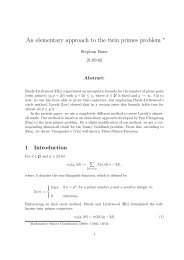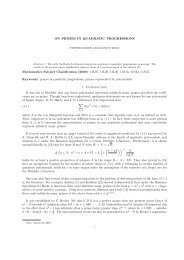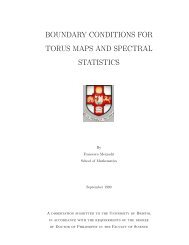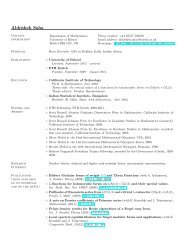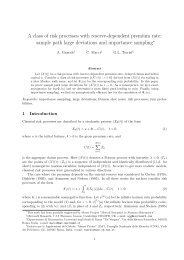Almost-all results on the p^\lambda problem
Almost-all results on the p^\lambda problem
Almost-all results on the p^\lambda problem
Create successful ePaper yourself
Turn your PDF publications into a flip-book with our unique Google optimized e-Paper software.
Obviously, we have<br />
S(∆) := �<br />
n, r ∼ Y,<br />
|t| ≤ ∆<br />
Combining (7) and (8), we obtain <strong>the</strong> desired estimate. ✷<br />
To optimize <strong>the</strong> estimate in Lemma 4, we choose<br />
1.<br />
S(∆) ≪ ∆Y 2−λ + Y. (8)<br />
Qh := 1 + �<br />
h 1/3 X (λ−2)/3 Y (λ+2)/3�<br />
.<br />
Then, by a short calculati<strong>on</strong> using J ≤ H = N t and XY = N, we obtain<br />
when<br />
Lemma 5: We have<br />
�<br />
h≤H<br />
This implies<br />
|Lh| 2 ≪ �<br />
N 1+λ/2+3t/2 + N 2−λ + N 2+t Y −1 + N 4/3+λ/3+4t/3 Y 1/3 +<br />
N 2/3+2λ/3+5t/3 Y 2/3 + N 4/3−2λ/3+t/3 Y 4/3�<br />
(log N).<br />
Lemma 6: For every sufficiently sm<str<strong>on</strong>g>all</str<strong>on</strong>g> fixed η > 0 we have<br />
provided <strong>the</strong> c<strong>on</strong>diti<strong>on</strong>s<br />
are satisfied.<br />
4 Treatment of Kh<br />
�<br />
|Lh|<br />
h≤H<br />
2 ≪ N 2−2η<br />
N t+100η ≤ Y ≤ N 2−λ−4t−100η ,<br />
t < (2 − λ)/3, t > 2(1 − λ)/5 (9)<br />
Heath-Brown established <strong>the</strong> following two estimates for Kh (see [11, pages 261-262]).<br />
Lemma 7: (i) We have<br />
6





